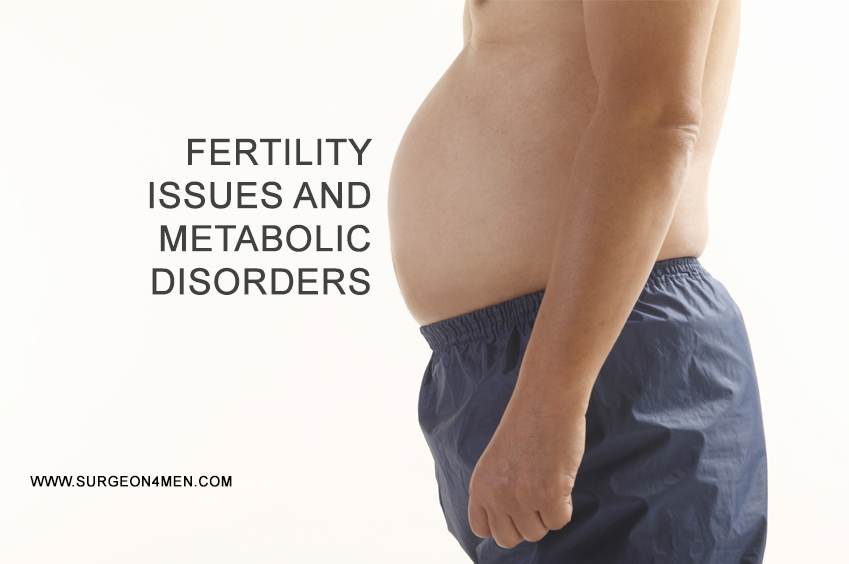Fertility Issues And Metabolic Disorders
Men experiencing fertility issues are more prone to develop metabolic disorders as they grow older, according to latest medical research. This information is vital because, approximately one in eight couples within United States experiences difficulty in getting pregnant and in about 40% cases, male infertility is the primary cause.
Scientists presented a study at European Association of Urology conference, Munich; (1), according to which male infertility aggravates the risk of developing serious metabolic and medical conditions such as osteoporosis and diabetes by 33%.
Pathophysiology Of Metabolic Disorders In Infertile Men
Previous research and clinical studies highlighted the role of male sex hormones in the maintenance of normal metabolism and other vital functions. It has been observed that infertile men tends to have low levels of sex hormones (such as testosterone) that may explain the link between metabolic disorders and hypogonadism.
A Swedish team carried out an extensive research study at Reproductive Medicine Centre of Malmo to examine various biomarkers, particularly protein HbA1c and bone mineral density along with testosterone levels and other sex hormones in men with low fertility.
Hormones Should Be Checked In Subfertile Men, But Testosterone Should Not Be Given
Men experiencing fertility issues or those who have sub-normal quality of semen, should immediately opt for sex hormones evaluation. But not every male is a candidate for testosterone replacement therapy. For example:
- Men who have low serum testosterone concentration and are obese, should make sincere efforts to reduce their body weight by incorporating healthy physical activities to their daily routine. This strategy is also helpful at reducing the risk of developing diabetes.
- Although, testosterone can improve the metabolic parameters and bone mineral density; thereby decreasing the risk of serious health issues as suggested by a study reported in the International Journal of Clinical Practice (2) , yet testosterone treatment should be avoided, especially when couple is seeking infertility treatments because testosterone have the tendency to suppress the production of sperms.
Testosterone Therapy In Older Men
In elderly men there is an established link between low levels of testosterone and metabolic disorders such as diabetes type 2, metabolic syndrome, osteoporosis and cardiac diseases (3, 4), though exact pathophysiology is not completely understood. It is suggested that low testosterone levels are a solid indicator of poor health in elderly men. Since testosterone treatment is very controversial and the risk/ benefit ratio of testosterone replacement in elderly males is undetermined, many doctors are not willing to start testosterone therapy in older men. However, according to Dr. Aleksander Giwercman, renowned PhD scientist at the Reproductive Medicine Center at Skåne University Hospital, “if there is no contraindication to testosterone replacement therapy (such as prostate cancer), then testosterone replacement should be considered in elderly men with very low levels of testosterone”.
References
1. Kasturi, S. S., Tannir, J., & Brannigan, R. E. (2008). The metabolic syndrome and male infertility. Journal of andrology, 29(3), 251-259.
2. Traish, A. M., Haider, A., Doros, G., & Saad, F. (2014). Long‐term testosterone therapy in hypogonadal men ameliorates elements of the metabolic syndrome: an observational, long‐term registry study. International journal of clinical practice, 68(3), 314-329.
3. Isidori, A. M., Balercia, G., Calogero, A. E., Corona, G., Ferlin, A., Francavilla, S., … & Maggi, M. (2015). Outcomes of androgen replacement therapy in adult male hypogonadism: recommendations from the Italian society of endocrinology. Journal of endocrinological investigation, 38(1), 103-112.
4. Bobjer, J., Bogefors, K., Isaksson, S., Leijonhufvud, I., Åkesson, K., Giwercman, Y. L., & Giwercman, A. (2016). High Prevalence of Hypogonadism and Associated Impaired Metabolic and Bone Mineral Status in Subfertile Men. Clinical endocrinology.
